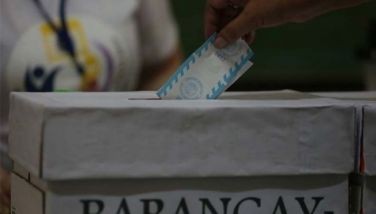Earthquake jolts Tokyo
Two of my Filipino friends have just obtained their British nationality. I met them while I was taking up my PhD studies in the United Kingdom. They are nurses who used to work in the United Arab Emirates. Like most, if not all, nurses in the Philippines, they studied nursing so that they will be able to work overseas.
For both of them, getting the opportunity to work in the Middle East was a dream come true, and being recruited from there to work in Great Britain was a fantasy turned reality. We have always kept in touch that was how I knew that they were no longer Filipino. One of them was so proud that he took pictures of the whole oath-taking ceremony and emailed them to everyone. The other so happy that she can now travel anywhere without applying for a visa.
But are my friends no longer Filipino? Or are they simply no longer carrying Philippine passports? (They have yet to decide whether they want to have dual citizenship or not as they had to surrender their passports first and then become British).
What does it mean to be “Filipino” anyway? Is it only having the passport and keeping it even if a better opportunity of living outside and traveling freely around the world present themselves? Or is it continuing to work in the Philippines and not leaving the country even if there are greater chances of earning more money and there is a bigger world outside ours?
There is no question that overseas Filipino nurses are earning much more now than they would’ve been should they still be in our country. These friends of mine, after only working for a couple of years in Bath and then in London, have already bought several houses and properties both in the UK and in the Philippines. One has acquired a 4x4 in Quezon City fully equipped with six (or maybe eight, I lost count) personal T.V. screens, and the other one has gotten a number of relatives whom she is sending to school.
Should they still be in our country, they would’ve probably been living with their parents, taking the jeepney to the hospital, and not being able to help their family financially.
There are more or less 210 countries, territories, and autonomous regions around the world and with a Filipino passport, one needs a visa in traveling to almost all of them (even in poorer countries such as in Africa).
I have had my share of trials and tribulations in applying for a visa. The time spent making the necessary travel reservations and then expecting the official invitation letter, going back and forth to the embassy or consular office, and waiting endlessly in line and for the visa itself. Not to mention the expenses that go with it (oftentimes, the visa fee can be restrictive). Plus the anxiety and apprehension of receiving the visa or not.
Luckily, I have been denied only once and it was for Macedonia. Their Embassy in London refused to give me a visa for reasons of safety. There was still some civil unrest in the capital of Skopje and I do not personally know anyone there who can guarantee my security. If I had a British passport, I would’ve already gone there, visited family and friends living abroad at the last minute, and saved a whole lot of money from not paying for all those visas.
So I can definitely understand why my friends were proud and happy when they finally became British citizens. Practically speaking, a Philippine passport can be an inconvenience, and sometimes, a handicap, especially if one wants to go outside the country to travel, to work, and to live for a long period of time.
Nationalists would argue that my friends are not really Filipino. They have forgotten their citizenship and exchanged it with a British passport. Extreme (okay, make that “fundamental”) nationalists would argue even more that they (and I myself) are not at all Filipino. We have chosen to live and work outside our motherland and let foreigners directly reap the benefits of our labor (i.e. brain drain).
I can only ask these so-called “nationalists” to redefine their meaning of nationalism. For me, being Filipino is being proud to be Filipino. Whenever I travel, I am always brandishing my green Filipino passport while I am in a foreign embassy or consulate. In the airport, particularly at the check-in counter, immigration desk, and even duty-free shops, I make sure that the people in line before, after, and near me see my Philippine passport. And when I do not have my Philippine passport handy, I usually try to include the fact that I am Filipino in any conversation that I have with the people I meet along the way. There were instances when the people I met have not even heard of the Philippines so I quickly transform myself into an unofficial ambassador giving them essential information about our country and its people.
And for most Filipinos working and living abroad, being Filipino means more than having the Philippine passport and staying (or make that “suffering,” e.g. subsisting with an income whose annual rate of increase is not greater than nor even as high as the rate of inflation) in the Philippines.
Being Filipino is studying and working hard to get out of this suffering. These nurse friends of mine have studied hard to get their diploma and even harder to pass the board exam. And they have been working the hardest in a foreign land, accepting graveyard shifts and weekend schedules (as “white” nurses refuse to do so), having both full-time and part-time jobs in different hospitals, and doing overtime work even if it means getting no more than four hours of sleep.
This is not just true for Filipino nurses but for most, if not all, of our overseas Filipino workers and immigrants around the world. They work really hard to earn some money that they can send back home to their family and relatives in the Philippines. They try not to spend a lot of their income so that they can have enough savings to visit the Philippines, once or twice a year if possible. Then they spend most of their savings while on vacation there by eating out, going shopping, hosting parties and get-togethers, renovating their house, constructing a new one, etc., etc. So being Filipino is also helping our fellow citizens and our country of citizenship (“original” citizenship, that is). If these examples are not love of family and of country, then I do not know what nationalism means.
One good thing about the Arroyo administration is that they passed the dual citizenship bill. This gives Filipinos overseas the opportunity to have the best of both worlds. The convenience of having a passport from the developed world for the benefits that go with it. And the importance of retaining the Philippine passport for the sense (a false one, in my opinion) of nationalism that it brings, among other things.
Like I said, my newly nationalized British friends have yet to decide whether they will remain Filipino citizens or not. But it does not really matter if they do so. They, and millions more, have studied and worked hard to be where they are now. And they continue to help fellow Filipinos and the Philippines with their remittances and local spending. They truly are our new heroes who will always be proud to be, and will always be, Filipino.
- Latest
- Trending


























